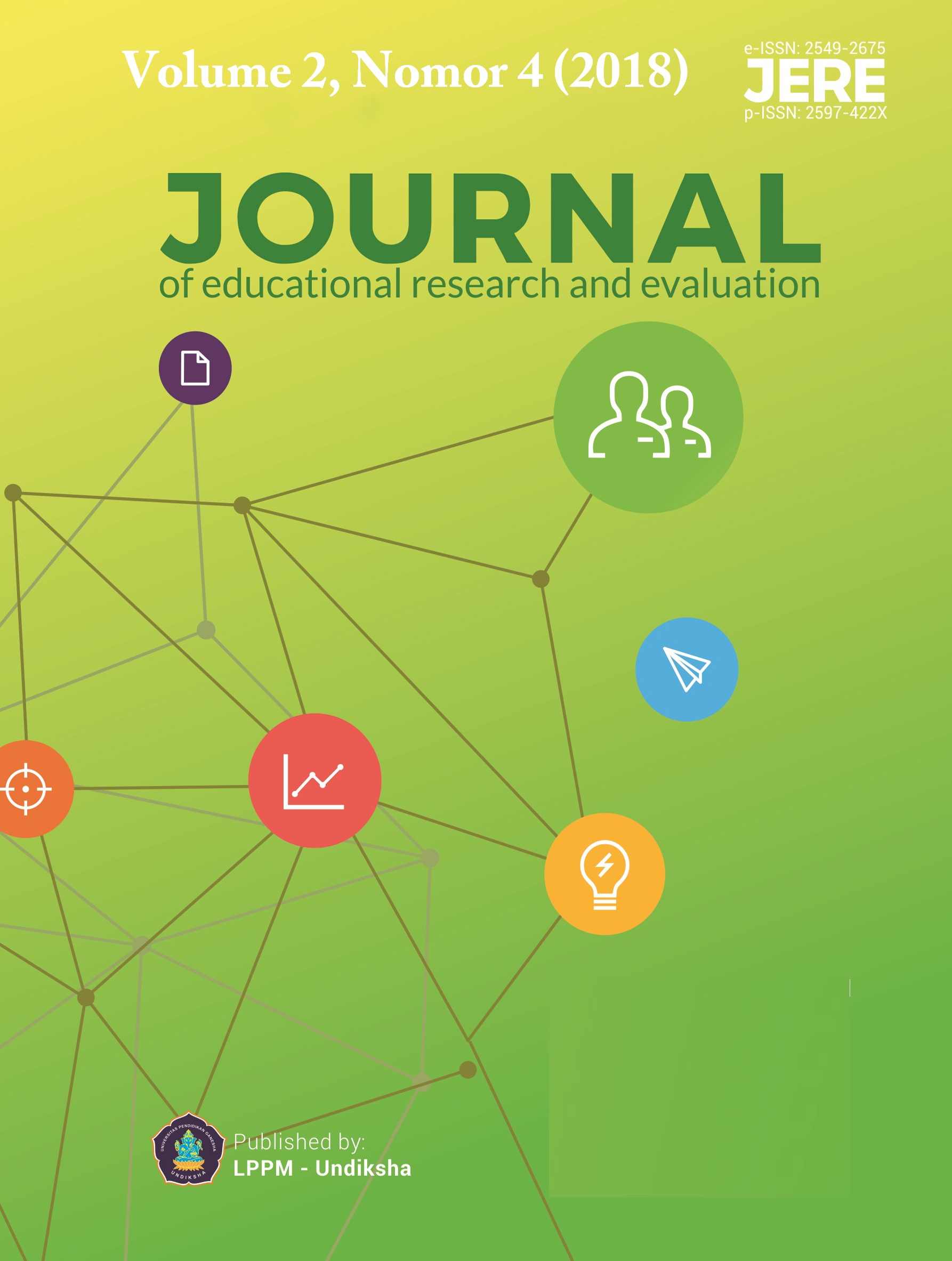THE EFFECTIVENESS OF THE USE OF “MojiGoiGo!” FLASH-BASED LEARNING MEDIA TOWARDS THE RESULTS OF THE JLPT-LIKE
DOI:
https://doi.org/10.23887/jere.v2i4.15528Keywords:
effectiveness, learning media, MojiGoiGo media, JLPTAbstract
The research aimed to know the effectiveness of the use of “Mojigoigo!” flash-based learning media towards the results of the JLPT-Like of the second-semester students majoring in Japanese Language Education of Ganesha Education University. The method used in the study was the experimental research method with the Pre-Experimental Design and the form used was One Group Pretest – Posttest Design. The instruments used were pre-test and post-test in the form of multiple choice questions which the material was equivalent of JLPT (JLPT-Like). The data analysis employed the t-test analysis. On the results of t-test, it retrieved (the value of sig. =0.006<0.05), meaning that on the statistical hypothesis Ho is rejected and the Ha is accepted, stating that "there is a significant difference between the average value of the pre-test from the average value of the post-test". It shows that the use of “Mojigoigo!”flash-based learning media is proved to be effective in improving the results of the JLPT-Like of the second-semester students majoring in Japanese Language Education of Ganesha Education University.
References
Cohen, Louis., Manion, Lawrence., dan Morrison, Keith. 2007. Research Methods in Education. London: Routledge.
Gon, Sonia dan Rawekar, Alka. 2017. Effectivity of E-Learning through Whatsapp as a Teaching Learning Tool. In : MVP Journal of Medical Sciences, Vol 4(1), 19–25, January-June 2017. Retrieved November 20, 2017, from: http://www.informaticsjournals.com/index.php/mvpjms/article/view/8454/13263
Hamad, Amani Asad Abdul-Azis. 2015. The Effectiveness of Adobe Flash Program on The Achievement of Sixth Graders in Technology and Their Attitudes Towards it at the Governmental Schools of Nablus City. Thesis. Nablus: An-Najah University. Retrieved November 19, 2017, from: https://scholar.najah.edu/sites/default/files/Amani%20Asad%20Abdul-Aziz%20Hamad.pdf
Hikmawati, Fenti. 2017. Metodologi Penelitian. Depok: Rajagrafindo Persada.
Robso, dkk. 2003, Mobile Learning and Handled Devices in The Classroom”. Eduworks Corporation, Corvallis Oregon. USA IMS. Australia.
Sugiar, Rani Hardiyanti. 2013. Efektivitas Penggunaan Metode Analisis Teks Teknik Catatan Tulis dan Susun (TS) Pada Pembelajaran Shokyu Choukai II. Bandung: Universitas Pendidikan Indonesia. Retrieved November 12, 2017, from: http://repository.upi.edu/2530/6/S_JEP_0902618_Chapter3.pdf
Sugiyono. 2009. Metode Penelitian Pendidikan: Pendekatan Kuantitatif, Kualitatif dan R&D Bandung: Alfabeta.
Susilana Rudi, Riyana Cepi. 2007. Media Pembelajaran Hakikat Pengembangan, Pemanfaatan dan Penilaian. Bandung : CV Wacana Prima
The Japan Foundation and Japan Educational Exchange. 2012. N1-N5 :
Summary of Linguistic Competence Required for Each Level. Didapat dari
: http://www.jlpt.jp/e/about/levelsummary.html
The Japan Foundation. 2015. Survey Report on Japanese-Language Education Abroad 2015. Retrieved November 17, 2017, from: https://www.jpf.go.jp/j/project/japanese/survey/result/dl/survey_2015/Report_all_e.pdf
Thoifah, L’anatut. 2015. Statistika Pendidikan dan Metode Penelitian Kuantitatif. Malang: Madani.
Torstein Rekkedal. 2005 Design Development and Evaluation of Mobile Learning. NKI Distance Education. NKI Forlaget.
Downloads
Published
How to Cite
Issue
Section
License
Authors who publish with the Journal of Evaluation and Research in Education (JERE) agree to the following terms:
- Authors retain copyright and grant the journal the right of first publication with the work simultaneously licensed under a Creative Commons Attribution License (CC BY-SA 4.0) that allows others to share the work with an acknowledgment of the work's authorship and initial publication in this journal.
- Authors are able to enter into separate, additional contractual arrangements for the non-exclusive distribution of the journal's published version of the work (e.g., post it to an institutional repository or publish it in a book), with an acknowledgment of its initial publication in this journal.
- Authors are permitted and encouraged to post their work online (e.g., in institutional repositories or on their website) prior to and during the submission process, as it can lead to productive exchanges, as well as earlier and greater citation of published work. (See The Effect of Open Access)











